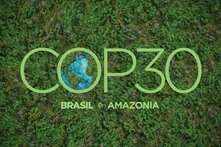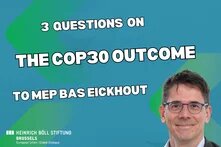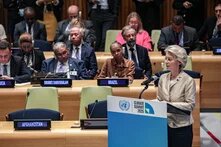The COP negotiations in Baku brought together global leaders, activists, and stakeholders amidst a tense geopolitical climate. With the influence of authoritarian leaders, ongoing debates over climate finance, and the presence of civil society under challenging conditions, the outcomes of this year’s talks were far from predictable. MEP Lena Schilling reflects on the key dynamics that shaped the negotiations and offers insights into the path forward for international climate action.

The COP in Baku took place amidst growing influence of or withdrawal from authoritarian leaders like Javier Milei and Donald Trump, who are critical of international climate cooperation. How did their presence—or the policies they represent—shape the dynamics of the negotiations, and what strategies were discussed to counteract their impact on global climate action?
It was a bad signal for climate justice that many country leaders did not attend COP this year. We cannot wait any longer, and it seems the climate crisis is still not being taken seriously enough by some very powerful leaders.
However, during the second week, when ministers joined, negotiations became more focused. Many parties tried their best to reach an agreement that supports those most affected by extreme weather events and ensures the phase-out of fossil fuels is secured.
During Trumps first term, many other countries were shocked and worked harder than before to counterbalance the fact that the US was not a reliable partner. We are also experiencing backtracking from some governments in the EU, and we must say it very clearly: backtracking and insufficient climate action threaten our livelihoods. It is crucial that emerging and high-GDP parties who acknowledge the climate crisis, such as China, Brazil, India, Australia, Canada, and the EU, come together and act now.
Climate finance remains a contentious issue. Were any substantial commitments made to bridge the gap between promises and the real needs of vulnerable nations? How can Europe push for accountability on these pledges, especially when some countries question their responsibility to contribute?
There was progress. These negotiations are an important place to build trust, and it worked in some cases. Contributions from developed countries will increase to $300 billion, and financial streams from China to the Global South will be made transparent. The previous goal of $100 billion annually was only reached years later than agreed. This time, developed countries must pay immediately. However, in the end, we must acknowledge that this is not enough. The needs of the most affected nations are much greater. With current policies, emissions will continue to rise, making global damages even more costly.
Negotiations on climate finance must continue in the coming years, with both emerging markets and developed countries increasing their contributions. And very importantly we have to make polluters pay through measures like taxes on fossil fuel extraction, higher taxes on high-emission luxury items like private jets, and clear price signals, such as the Emission Trading Systems (ETS), applied to all sectors. Decisive action is needed to increase these taxes and use the revenues to support the most vulnerable.
This year’s COP saw both significant activist presence and restrictions by the host country. How effective were civil society and youth voices in influencing the outcomes? Did their participation make a tangible difference despite the challenges posed by the political context in Baku?
The role of activists is crucial. However, the space for them was severely restricted, which is deeply discouraging for many young people. The UNFCCC parties must work harder to ensure that civil society can raise its voice. It is unacceptable for climate negotiations to be dominated by the fossil fuel industry. Despite these challenges, it was incredibly inspiring to see that people, undeterred by the circumstances, continued to engage in creative, powerful, and brave actions on the ground.
We cannot overstate how vital civil society has been in driving progress in climate policy over the years. It is horrendous that the government of Azerbaijan is holding society hostage. I call on the European Commission to present further proposals for sanctions against regimes that imprison critical voices and suppress dissent.
The views and opinions in this article do not necessarily reflect those of the Heinrich-Böll-Stiftung European Union.


